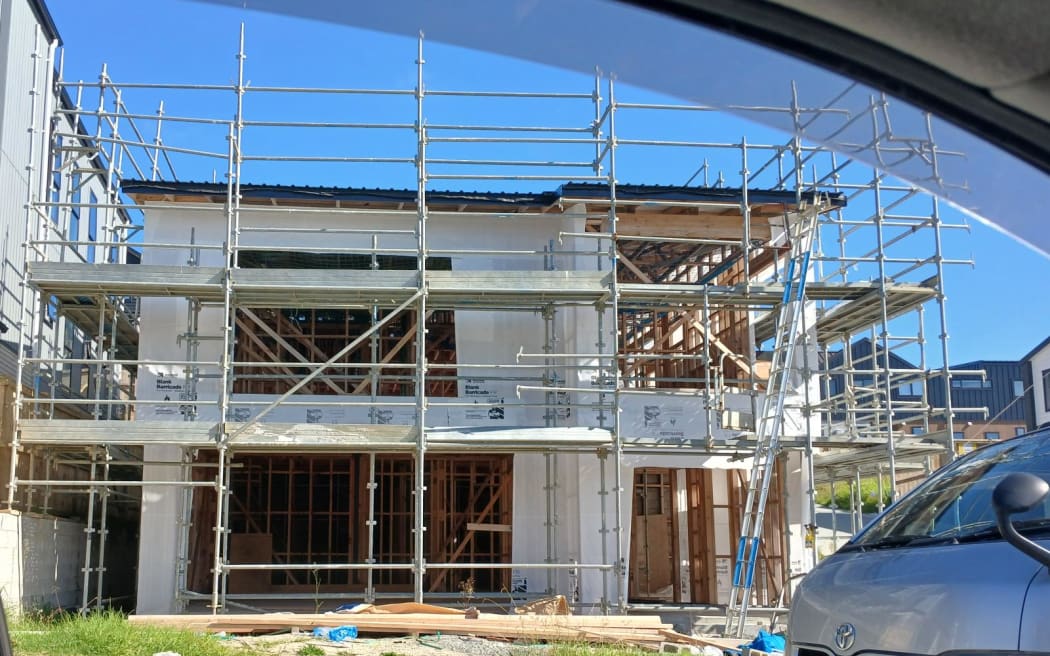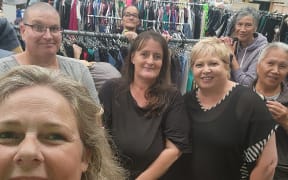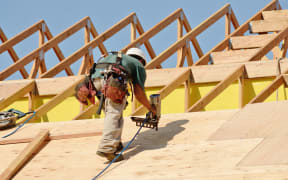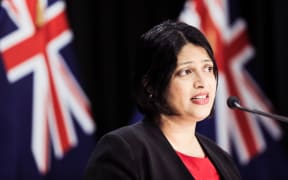
The house at the centre of the Suicide Reduction Trust 'Win a House' promotion Photo: RNZ/Katie Fitzgerald
The charity behind the 'Win a House' promotion is not yet registered and planning to use the raffle proceeds to buy the property.
The Suicide Reduction Trust was established in February 2024, and said it aims to teach New Zealanders "self-acceptance" to help with mental wellbeing.
The trust has not yet started work in the area of mental health, and the raffle is its first major initiative since founding.
The raffle is for a $2 million home in Auckland, a Tesla Model 3 and $50,000 worth of furniture.
To promote the competition, it is running advertising on television, radio, and a billboard Auckland's southern motorway.
In the terms and conditions of the competition it said the organisation's registered charity status is "pending" after submitting a completed application.
The Department of Internal Affairs said in a statement the Suicide Reduction Trust does not have a formal pending status, as pending or temporary statuses are not part of the Charities Act.
Charity founder Dave Jacques told RNZ he uses the word "pending" as his own term, and views registration as a rubber stamp exercise.
"They've got all the complete documents, so we've got the e-mail advising they've got all the complete documents, but they haven't told us yes or no yet. So, what do you call the status we're in?"
Suicide Reduction Trust does have a gambling Class 3 Operators Licence to run the raffle, which is only granted to charities, but the charity does not need to be a registered charity to get a licence.
The Department of Internal Affairs said non-registered charities can refer to themselves as charities, but it an offence for non-registered charities to hold themselves out as registered charities.
It said it is still assessing the application from the Suicide Reduction Trust.
The raffle
The house at the centre of the promotion is a six bedroom, four-bathroom house in the Auckland suburb of Flatbush.
It is currently under construction and, according to the description for the competition, is expected to be completed in September 2024.
The house is listed as "under contract" online, Jaques said he has made the sale conditional on the outcome of the raffle, as the proceeds from the raffle will finance the sale.
"If the raffle generates $5 million for example, then the raffle proceeds can be used to purchase the House.
"If the raffle only generates $1 million off proceeds, then you're better off to cancel the raffle and refund everyone's money than you are to complete an exercise that didn't work out," he said.
The raffle is open for entry until late June. A series of ads are running until then are advertising the raffle - but not the Suicide Reduction Trust - and repeating the phrase "win a house".
Jaques said he was aware of three complaints about the repetitiveness of the advert. The Advertising Standards Authority has confirmed it has received one formal complaint about the advertising but would not disclose the nature of the complaint.
Jaques said it was deliberate choice for the advertising to not reference the Suicide Reduction Trust.
"It's a longer discussion to talk about the actual purpose. It's quite quick and easy from a marketing point of view to say 'I'm running a big raffle. Do you want to buy a ticket?' But when people go to look at the ticket [it explains the purpose].
"I did a blog recently that we've had three people complain that the ad is repetitive and intense, except each one of them knew what the charitable purpose was that the raffle was for. The only way they could have known that is by the ad being effective, by going on to the website."
The trust
The Suicide Reduction Trust has not begun any work yet. Jaques said the raffle is the first piece of work, to fundraise money to establish programmes.
Jaques said the trust may use a psychology chat bot to deliver some of its programmes, and the cost for that would be the same regardless of how many people used it, so they need a big fundraising push at the start.
"We're going to get it custom built. There's over a dozen platforms available and then you pay a psychiatrist or a medically qualified person to tailor it to your criteria and an IT programmer to configure it to your criteria and then you get the chat bot behaving in the way you want it to do."
Jaques said he has not yet found a preferred vendor for the chat bot.
The plan for the trust is to focus on therapy that promotes self-acceptance, and focusses on the future. Jaques said it is not intending to work with people experiencing suicidal ideation, rather provide resilience training with the aim of preventing people from reaching a point where they're considering suicide later in life.
"The purpose of the trust is to reduce suicide. We are not an organisation that just helps you live a more fulfilling life or better quality marriages, better quality parenting.
"We are here to stop people dying prematurely. That's the whole reason we do it. We really care about it. It's our sole focus."






